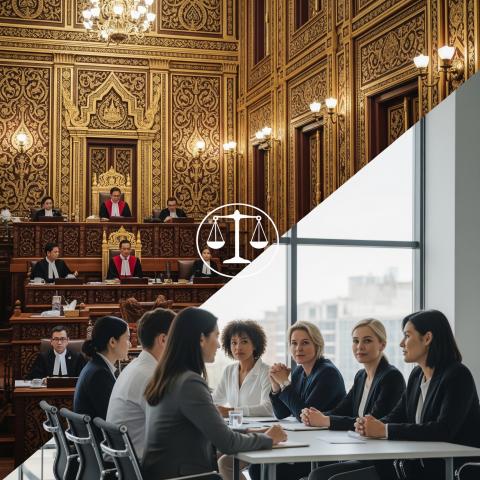Navigating Civil Cases in Thailand: Legal Support for Foreigners
Facing a civil dispute in Thailand as a foreigner can be daunting. PS Law & Business offers expert legal guidance for civil cases, ensuring your rights are protected.
Civil law in Thailand governs disputes between individuals or organizations where financial compensation or specific actions are sought. Unlike criminal cases, which involve the state prosecuting an individual for an offense, civil cases typically revolve around private rights and obligations. For foreigners in Bangkok or elsewhere in Thailand, understanding this distinction and the local legal landscape is crucial when facing a legal challenge.
At PS Law & Business, we provide comprehensive legal services for a wide array of civil matters. Our team of experienced English-speaking lawyers in Bangkok is well-versed in Thai civil law and court procedures, offering tailored advice and representation to our international clients. We understand the unique challenges foreigners may face, from language barriers to unfamiliarity with the local legal system.
Common Types of Civil Cases We Handle for Foreigners:
- Contract Disputes: Disagreements arising from business agreements, service contracts, sales contracts, lease agreements (e.g., property rental disputes), and loan agreements. We assist in enforcing contractual terms or seeking remedies for breaches.
- Property Disputes: Issues related to property ownership, boundaries, condominium disputes, and construction defects. Navigating Thai property law can be complex for foreigners, and our lawyers provide clarity and robust representation.
- Debt Recovery: Assisting individuals and businesses in recovering outstanding debts through negotiation or legal action in Thai courts.
- Torts and Personal Injury Claims: Cases where harm has been caused due to negligence or wrongful acts, such as accidents or defamation. We help clients seek fair compensation for damages suffered.
- Business and Commercial Disputes: Conflicts arising from business operations, shareholder disagreements, partnership issues, and other commercial disagreements.
- Consumer Protection Cases: Representing foreigners in disputes with businesses over goods or services that do not meet legal standards or contractual obligations.
The Civil Litigation Process in Thailand for Foreigners:
While each case is unique, the general process for civil litigation in Thailand typically involves the following stages:
- Legal Consultation: Discussing your case with a lawyer to assess its merits, understand your legal options, and strategize the best course of action.
- Demand Letter/Negotiation: Often, the first step is to send a formal demand letter to the opposing party, outlining your claims and seeking a resolution. Negotiation and mediation are encouraged to settle disputes amicably and cost-effectively.
- Filing a Complaint (Plaint): If negotiation fails, your lawyer will prepare and file a formal complaint with the appropriate Thai court. This document details the facts of the case, the legal grounds for your claim, and the remedy sought. All court documents must be in Thai.
- Court Summons and Defendant's Response: The court will issue a summons to the defendant, who then has a specified period to file a response (answer) to the complaint.
- Mediation: Thai courts often encourage or mandate mediation to facilitate a settlement between the parties before proceeding to trial.
- Evidence Disclosure and Witness Preparation: Both parties will gather and disclose evidence, and prepare witness testimonies. This may include documents, expert opinions, and personal accounts.
- Trial: If no settlement is reached, the case will proceed to trial. Your lawyer will present your case, examine witnesses, and make legal arguments before the judge. Court proceedings are conducted in Thai, so an accredited interpreter is necessary if you do not speak Thai.
- Judgment: After considering all evidence and arguments, the court will issue a judgment.
- Appeal (if applicable): If either party is dissatisfied with the judgment, they may have the right to appeal to a higher court, such as the Court of Appeals or the Supreme Court, under specific conditions.
- Enforcement of Judgment: If a judgment is in your favor and the other party does not comply, legal steps may be required to enforce the court's decision.
Why Choose PS Law & Business for Your Civil Case?
- Focus on Foreign Clients: We specialize in assisting English-speaking foreigners, understanding their specific needs and concerns.
- Experienced Litigators: Our lawyers have a strong track record in handling diverse civil litigation matters in Thai courts.
- Clear Communication: We provide clear, concise explanations of Thai law and legal procedures in English, ensuring you are fully informed throughout your case.
- Strategic Approach: We develop tailored legal strategies aimed at achieving the best possible outcome for your situation, whether through negotiation, mediation, or litigation.
- Based in Bangkok, Serving Thailand: While our main office is in Bangkok, we can assist with civil cases throughout Thailand.
Navigating a civil dispute in a foreign country requires knowledgeable and reliable legal representation. At PS Law & Business, we are committed to providing professional, effective, and understandable legal support to foreigners facing civil law challenges in Thailand.
Frequently Asked Questions (FAQ)
Q: As a foreigner, can I file a civil lawsuit in Thailand?
A: Yes, foreigners have the right to file civil lawsuits in Thai courts. It is highly recommended to engage a Thai lawyer to represent you, as legal proceedings are conducted in Thai and require a thorough understanding of local laws and procedures.
Q: How long does a civil case typically take in Thailand?
A: The duration of a civil case can vary significantly depending on its complexity, the court's caseload, whether it goes to trial, and if there are any appeals. Simple cases might be resolved within months, while complex litigation can take several years.
Q: What are the costs involved in a civil case in Thailand?
A: Costs can include court fees (which are typically a percentage of the amount claimed), lawyer's fees, translation costs for documents, interpreter fees for court hearings, and other related expenses. Your lawyer will discuss the potential costs with you during the initial consultation.
Q: Do I need to be present in Thailand for my civil case?
A: While your presence may be required for certain key stages, such as mediation or testifying in court, your lawyer can often handle many aspects of the case on your behalf with a duly executed Power of Attorney. Your lawyer will advise you on when your presence is necessary.
Q: What if the other party in my dispute is also a foreigner?
A: Thai courts can hear civil cases between foreigners, provided the court has jurisdiction over the matter (e.g., the dispute arose in Thailand or one of the parties is domiciled in Thailand).
Q: Is mediation common for civil disputes in Thailand?
A: Yes, mediation is strongly encouraged by the Thai courts as a means of resolving disputes amicably and efficiently. Many cases are successfully settled through court-supervised or private mediation.
External Links for Further Information:
- The Judiciary of Thailand: Official website of the Thai courts, offering some information in English.
- Thailand Arbitration Center (THAC): Provides information on alternative dispute resolution methods like mediation and arbitration in Thailand.










